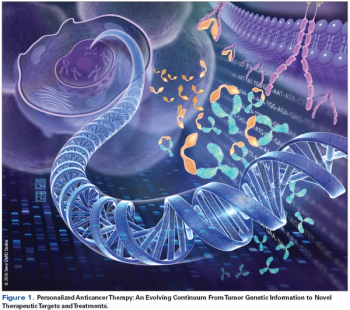
Massimo Cristofanilli, MD
Articles by Massimo Cristofanilli, MD




In this interview we discuss the use of CTCs and circulating tumor DNA for prognosis and disease monitoring in patients with breast cancer.

This review describes the achievements in therapeutic and molecular diagnostics, details evolving molecular platforms, and highlights the challenges for the translation of these developments to daily clinical practice.

This review will focus on properties of cancer stem cells; will compare and contrast the cancer stem cell model with the clonal evolution model of tumorigenesis; will discuss the role of cancer stem cells in the development of resistance to chemotherapy; and will review the therapeutic implications and challenges of targeting cancer stem cells, with an assessment of the potential such an approach holds for improving outcomes for patients with cancer.

The last two decades have seen the development of a variety of novel therapeutic agents that have improved prognoses for women with breast cancer.

Over the past decade, inflammatory breast cancer (IBC), a rare and aggressive subtype of locally advanced breast cancer (LABC), has received much attention at the level of public awareness as well as at the level of research.

In this issue of ONCOLOGY, Houchens and Merajver[3] have commendably attempted to summarize the results of existing research into the molecular determinants of this aggressive disease. The authors have focused specifically on classical prognostic and predictive markers, although these are not specific to the IBC breast tumor subtype.

Important therapeutic innovations within the past several years have resulted in only modest survival benefits for women with metastatic breast cancer. In this setting, cancer remains incurable and treatment is mainly palliative, involving judiciously applied multiple endocrine, chemotherapeutic, or biologic therapies in an attempt to induce a series of remissions and, ultimately, adequate palliation. At present, we lack both a consensus management algorithm and an ideal treatment model of specific subsets of women.

Inflammatory breast cancer (IBC) is a rare and aggressive form of the disease. It is diagnosed based on clinical signs of a rapidly enlarging, tender, erythematous, edematous breast that often presents without an underlying breast mass. IBC historically was considered a uniformly fatal disease. With the advent of multimodality treatments including primary systemic chemotherapy, surgery, and radiation therapy, approximately one-third of women diagnosed with IBC will become long-term survivors. This review examines the limitations of the current definition of IBC, explores our current understanding of the biology of IBC, and reviews the many exciting advances in locoregional and systemic treatment of IBC.
Latest Updated Articles
 Circulating Tumor Cells: Toward Sophisticated Approaches in Managing Metastatic Breast Cancer
Circulating Tumor Cells: Toward Sophisticated Approaches in Managing Metastatic Breast CancerPublished: June 1st 2008 | Updated:
 Inflammatory Breast Cancer: A Complex Disease
Inflammatory Breast Cancer: A Complex DiseasePublished: December 1st 2008 | Updated:
 Brain Metastasis in Breast Cancer: Last Barrier to the Cure?
Brain Metastasis in Breast Cancer: Last Barrier to the Cure?Published: July 12th 2012 | Updated:
 Inflammatory Breast Cancer: What Progress Have We Made?
Inflammatory Breast Cancer: What Progress Have We Made?Published: March 15th 2011 | Updated:
 What Progress Have We Made in Managing Inflammatory Breast Cancer?
What Progress Have We Made in Managing Inflammatory Breast Cancer?Published: April 30th 2007 | Updated:
 Cancer Stem Cells: Implications for Cancer Therapy
Cancer Stem Cells: Implications for Cancer TherapyPublished: December 15th 2014 | Updated:
